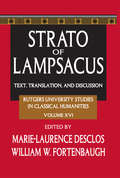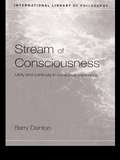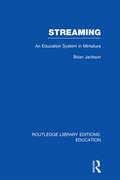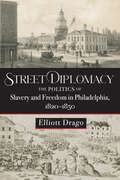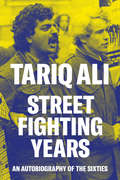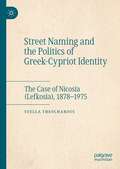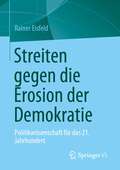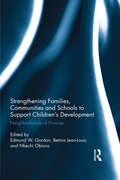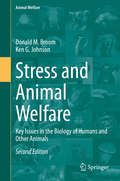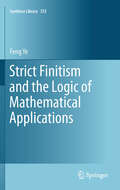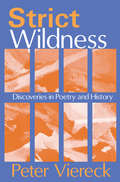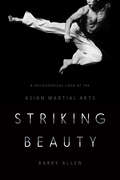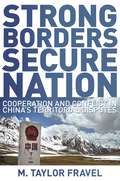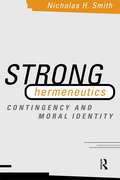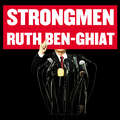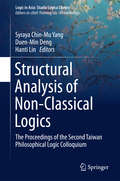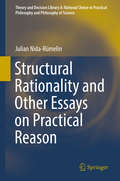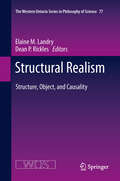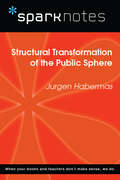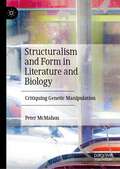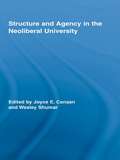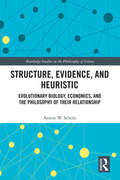- Table View
- List View
Strato of Lampsacus: Text, Translation and Discussion (Rutgers University Studies in Classical Humanities)
by William FortenbaughVolume 16 of Transaction's acclaimed Rutgers University Studies in Classical Humanities series, continues the work of Project Theophrastus on the School of Aristotle. The subject of this volume is Strato of Lampsacus in Mysia on the Hellespont. Strato was the third head of the Peripatetic School after Aristotle and Theophrastus. He succeeded the latter in c. 286 BCE and was in turn succeeded by Lyco of Troas in c. 268. Diogenes Laertius describes Strato as a distinguished person who became known as "the physicist," because more than anyone else he devoted himself to the careful study of nature. Strato's concern with the physical world is well attested by the titles of his books: On the Void, On the Heaven, and On the Wind. His other books point to a keen interest in human physiology, animal life and diseases. But it would be a mistake to think that Strato was uninterested in other areas of philosophic concern. Indeed, he wrote works on logic, first principles, theology, politics and ethics. None of this work survives intact, but the reports that have come down to us reveal much of present-day interest. Included is a new and complete edition of the ancient sources, together with a critical apparatus to the ancient texts, an English translation, and notes to the translation.
Straw Dogs: Thoughts on Humans and Other Animals
by John GrayThe British bestseller Straw Dogs is an exciting, radical work of philosophy, which sets out to challenge our most cherished assumptions about what it means to be human. From Plato to Christianity, from the Enlightenment to Nietzsche and Marx, the Western tradition has been based on arrogant and erroneous beliefs about human beings and their place in the world. Philosophies such as liberalism and Marxism think of humankind as a species whose destiny is to transcend natural limits and conquer the Earth. John Gray argues that this belief in human difference is a dangerous illusion and explores how the world and human life look once humanism has been finally abandoned. The result is an exhilarating, sometimes disturbing book that leads the reader to question our deepest-held beliefs. Will Self, in the New Statesman, called Straw Dogs his book of the year: "I read it once, I read it twice and took notes . . . I thought it that good." "Nothing will get you thinking as much as this brilliant book" (Sunday Telegraph).
Stream of Consciousness: Unity and Continuity in Conscious Experience (International Library of Philosophy)
by Barry DaintonStream of Consciousness is about the phenomenology of conscious experience. Barry Dainton shows us that stream of consciousness is not a mosaic of discrete fragments of experience, but rather an interconnected flowing whole. Through a deep probing into the nature of awareness, introspection, phenomenal space and time consciousness, Dainton offers a truly original understanding of the nature of consciousness.
Streaming: An Education System in Miniature (Routledge Library Editions: Education)
by Brian JacksonIn this volume a streamed school is studied in detail and parents’ responses are recorded. Eleven plus is (and has been) under criticism, but many children are selected by a ‘seven plus’ because they are streamed into A, B or C classes. Few children escape the label once it is pinned on them – less than six in one hundred change their stream. The study shows that on a national sample the date on which a child is born – irrespective of his ability – affects his or her stream at the age of 7 and his results at eleven plus. Finally ten streamed schools are compared, academically and socially, with ten unstreamed schools. In the final chapters the author makes practical proposals by which primary schools could recognise and increase the flow of gifted children.
Street Diplomacy: The Politics of Slavery and Freedom in Philadelphia, 1820–1850
by Elliott DragoAn illuminating look at how Philadelphia's antebellum free Black community defended themselves against kidnappings and how this "street diplomacy" forced Pennsylvanians to confront the politics of slavery.As the most southern of northern cities in a state that bordered three slave states, antebellum Philadelphia maintained a long tradition of both abolitionism and fugitive slave activity. Although Philadelphia's Black community lived in a free city in a free state, they faced constant threats to their personal safety and freedom. Enslavers, kidnappers, and slave catchers prowled the streets of Philadelphia in search of potential victims, violent anti-Black riots erupted in the city, and white politicians legislated to undermine Black freedom. In Street Diplomacy, Elliott Drago illustrates how the political and physical conflicts that arose over fugitive slave removals and the kidnappings of free Black people forced Philadelphians to confront the politics of slavery. Pennsylvania was legally a free state, at the street level and in the lived experience of its Black citizens, but Pennsylvania was closer to a slave state due to porous borders and the complicity of white officials. Legal contests between slavery and freedom at the local level triggered legislative processes at the state and national level, which underscored the inability of white politicians to resolve the paradoxes of what it meant for a Black American to inhabit a free state within a slave society. Piecing together fragmentary source material from archives, correspondence, genealogies, and newspapers, Drago examines these conflicts in Philadelphia from 1820 to 1850. Studying these timely struggles over race, politics, enslavement, and freedom in Philadelphia will encourage scholars to reexamine how Black freedom was not secure in Pennsylvania or in the wider United States.
Street Fighting Years: An Autobiography of the Sixties
by Tariq AliOne of the world&’s best-known radicals relives the early years of the protest movementWhat makes a young radical? Reissued to coincide with the fiftieth anniversary of 1968, Street Fighting Years captures the mood and energy of an era of hope and passion as Tariq Ali tracks the growing significance of the 1960s protest movement, as well as his own formation as a leading political activist.Through his personal story, he recounts a counter-history of a sixties rocked by the Prague Spring, student protests on the streets of Europe and America, the effects of the Vietnam war, and the aftermath of the revolutionary insurgencies led by Che Guevara. It is a story that takes us from Paris and Prague to Hanoi and Bolivia, encountering along the way Malcolm X, Bertrand Russell, Marlon Brando, Henry Kissinger, and Mick Jagger.This edition includes the famous interview conducted by Tariq Ali and Robin Blackburn with John Lennon and Yoko Ono In 1971.
Street Naming and the Politics of Greek-Cypriot Identity: The Case of Nicosia (Lefkosia), 1878–1975
by Stella TheocharousThis book is the first to explore street names and street-naming in the formation of a Greek-Cypriot identity in the cityscape of Nicosia between 1878 and 1975. Rather than treating toponymy as a direct linguistic act of spatial orientation, the book approaches street-naming as a contested practice involving those shared symbols and representations used to depict official history and collective identity as part of a political process. It considers how street names are part of the symbolic politics of space, and how authorities transformed the streets of Nicosia into arenas of struggle for the control of symbolic and material space. It documents historical efforts over the course of a century to impose a ‘geography of forgetting’ to buttress national identity and to cast out the ‘other’ from space — both literally and symbolically — so as to achieve territorial dominance and political legitimacy. The book is another step towards the development of a global perspective on the critical study of street-naming, thereby refining and expanding our knowledge of the political dynamics involved in the process. In their commemorative capacity, street names belong to the politics of public memory and identity.
Streiten gegen die Erosion der Demokratie: Politikwissenschaft für das 21. Jahrhundert
by Rainer EisfeldEuropaweit und darüber hinaus unterliegen Demokratien alarmierender Aushöhlung. Rapider wirtschaftlicher, kultureller, politischer Wandel weckt Unsicherheiten und Aggressionen; Politiker, Parteien, selbst Regierungen versuchen Bürger durch systematische Lügen zu täuschen; neoliberale Deregulierungen schwächen die Bereitschaft zum zivilgesellschaftlichen Engagement; schroffe Einkommens- und Vermögensunterschiede treiben die Demokratie in Richtung Plutokratie; fremdenfeindliche Vorurteile polarisieren Gesellschaften; Antiterrorismus-Strategien untergraben bürgerliche Freiheiten; Vetospieler hemmen klimapolitischen Wandel. Zugleich wird seit Jahren gestritten über die Fragmentierung der Politikwissenschaft, ihre zweifelhafte Relevanz und ihre Abkopplung von der breiten Öffentlichkeit. Dieses Buch ist die erste umfassende Studie, die beide Fragenkomplexe miteinander verknüpft und präzise zu ergründen sucht: Wie kann, wie sollte die Politikwissenschaft dem Niedergang der Demokratie in jedem der erwähnten Bereiche entgegenwirken?Rainer Eisfelds Antworten lauten: Entwicklung einer Wissenschaftskultur öffentlichen Engagements; Auseinandersetzung mit Ursprüngen, Mustern und partizipativer Bewältigung durchgängigen Wandels als Hauptgegenstand der Disziplin; kategorisches Auftreten gegen Tendenzen zu einer Herrschaft notorischer Lügner; Konzentrierung der Forschungsprioritäten auf die Schlüsselbereiche, in denen Demokratie sich zurückbildet; für Laien zugängliche Darstellung gewonnener Resultate; Erweiterung der Analyse zur Präsentation konkreter Gestaltungsvorschläge.Dazu, so Eisfelds Fazit, bedarf es einer Disziplin, die als normativ orientierte, empirisch gestützte Demokratiewissenschaft brisanten Problemen den Vorrang einräumt vor ausgefeilten Methoden und bürgernaher Relevanz vor immer weiterer Spezialisierung.
Strengthening Families, Communities, and Schools to Support Children's Development: Neighborhoods of Promise
by Edmund W. Gordon Betina Jean-Louis Nkechi ObioraDrawing on a range of contexts influenced by the Promise Neighborhoods Program—a federal place-based initiative to improve educational outcomes for students in distressed urban and rural neighborhoods—this book outlines effective characteristics and elements for implementing supplementary education. Chapter authors demonstrate that the disparities in educational achievement between white and non-white students can only be addressed by a holistic approach that takes the communities in which schools are situated as its focal point. This edited collection distills the insights gained from the communities implementing such comprehensive education programs and provides the framework and models for reproducing such successes.
Stress and Animal Welfare: Key Issues in the Biology of Humans and Other Animals (Animal Welfare #19)
by Donald M. Broom Ken G. JohnsonThis is the Second Edition of a well-received book that reflects a fresh, integrated coverage of the concepts and scientific measurement of stress and welfare of animals including humans. This book explains the basic biological principles of coping with many forms of adversity. The major part of this work is devoted to explaining scientifically usable concepts in stress and welfare. A wide range of welfare indicators are highlighted in detail with examples being drawn from man and other species. The necessity for combining information from disciplines is emphasized with a one-health, one-welfare approach. This information forms the basis for a synthesis of new ideas. Among the issues covered are:- How brain and body systems regulate using feelings, physiological responses, behaviour and responses to pathology- Limits to adaptation- Assessing positive and negative welfare during both short-term and long-term situations- Ethical problems and suggested solutionsA proper assessment of animal welfare is essential to take informed decisions about what is morally acceptable in terms of practice and in the development of a more effective legislation. This work encapsulates a very wide body of literature on scientific aspects of animal welfare and will thus prove a valuable asset for animal welfare scientists, psychologists, students and teachers of all forms of biology, behaviour, medicine, veterinary medicine and animal usage.
Strict Finitism and the Logic of Mathematical Applications
by Feng YeThis book intends to show that radical naturalism (or physicalism), nominalism and strict finitism account for the applications of classical mathematics in current scientific theories. The applied mathematical theories developed in the book include the basics of calculus, metric space theory, complex analysis, Lebesgue integration, Hilbert spaces, and semi-Riemann geometry (sufficient for the applications in classical quantum mechanics and general relativity). The fact that so much applied mathematics can be developed within such a weak, strictly finitistic system, is surprising in itself. It also shows that the applications of those classical theories to the finite physical world can be translated into the applications of strict finitism, which demonstrates the applicability of those classical theories without assuming the literal truth of those theories or the reality of infinity. Both professional researchers and students of philosophy of mathematics will benefit greatly from reading this book.
Strict Wildness: Discoveries in Poetry and History
by Peter ViereckA reviewer once called Peter Viereck's thought "not common sense but inspired, electric common sense." This volume of Viereck's selected essays on poetry and on history, written between 1938 through 2004, exemplifies this quality. Its main theme is suggested in Viereck's coined phrase "strict wildness," which suggests a balance between restraint (which by itself is staid and rigid) and passion (which by itself is incoherent). Frost called free verse tennis without the net. Viereck calls dead mechanical form "net without the tennis." Strict wildness, then, is spontaneity of feeling within strict organic form.The book explores questions of modernism and poetic craft with respect to American poetry. It discusses the controversy over Ezra Pound's politics and its relation to his poetics, as well as the nearly forgotten poet Vachel Lindsay. Viereck offers more general views on poetics, including the fruitful tensions between form and content, and the impact of modern technology on poetic expression. He also discusses history and politics, and contains essays on McCarthyism, the Cold War, political conformity of the Left and Right, and discusses issues of historiography and culture that define Viereck's highly individual, often critical brand of conservatism. In treating representative trends and figures in conservative thought, Viereck insists on clear awareness of what exists to conserve, what ought to be conserved, and why it should be conserved.In their range and originality, the writings brought together in Strict Wildness constitute an ideal introduction to Peter Viereck's literary and political thought and how they come together. It will be of interest to literary scholars, intellectual historians, and social scientists. The introduction allows the reader to grasp a clear sense of the context and background of Viereck's works.
Striking Beauty
by Barry AllenThe first book to focus on the intersection of Western philosophy and the Asian martial arts, Striking Beauty collapses the boundaries between Eastern and Western thought, comparatively studying the historical and philosophical traditions of martial arts practice and their ethical value in the modern world. Expanding Western philosophy's global outlook, the book forces a theoretical reckoning with the concerns of Chinese philosophy and the aesthetic and technical dimensions of martial arts practice. Striking Beauty explains the relationship between Asian martial arts and the Chinese philosophical traditions of Confucianism, Buddhism, and Daoism in addition to the strategic wisdom of Sunzi's Art of War. It connects martial arts practice to the Western concepts of mind-body dualism and materialism, sports aesthetics, and the ethics of violence. Incorporating innovations in body phenomenology, somaesthetics, and embodied cognition, the work ameliorates Western philosophy's hostility toward the body, emphasizing the pleasure of watching and engaging in martial arts, along with their beauty and the ethical problem of their violence.
Striking Beauty: A Philosophical Look at the Asian Martial Arts
by Barry AllenThe first book to focus on the intersection of Western philosophy and the Asian martial arts, Striking Beauty comparatively studies the historical and philosophical traditions of martial arts practice and their ethical value in the modern world. Expanding Western philosophy's global outlook, the book forces a theoretical reckoning with the concerns of Chinese philosophy and the aesthetic and technical dimensions of martial arts practice.Striking Beauty explains the relationship between Asian martial arts and the Chinese philosophical traditions of Confucianism, Buddhism, and Daoism, in addition to Sunzi's Art of War. It connects martial arts practice to the Western concepts of mind-body dualism and materialism, sports aesthetics, and the ethics of violence. The work ameliorates Western philosophy's hostility toward the body, emphasizing the pleasure of watching and engaging in martial arts, along with their beauty and the ethical problem of their violence.
Strong Borders, Secure Nation: Cooperation and Conflict in China's Territorial Disputes (Princeton Studies in International History and Politics #111)
by M. Taylor FravelAs China emerges as an international economic and military power, the world waits to see how the nation will assert itself globally. Yet, as M. Taylor Fravel shows in Strong Borders, Secure Nation, concerns that China might be prone to violent conflict over territory are overstated. The first comprehensive study of China's territorial disputes, Strong Borders, Secure Nation contends that China over the past sixty years has been more likely to compromise in these conflicts with its Asian neighbors and less likely to use force than many scholars or analysts might expect. By developing theories of cooperation and escalation in territorial disputes, Fravel explains China's willingness to either compromise or use force. When faced with internal threats to regime security, especially ethnic rebellion, China has been willing to offer concessions in exchange for assistance that strengthens the state's control over its territory and people. By contrast, China has used force to halt or reverse decline in its bargaining power in disputes with its militarily most powerful neighbors or in disputes where it has controlled none of the land being contested. Drawing on a rich array of previously unexamined Chinese language sources, Strong Borders, Secure Nation offers a compelling account of China's foreign policy on one of the most volatile issues in international relations.
Strong Hermeneutics: Contingency and Moral Identity
by Nicholas H. SmithRecent years have seen a resurgence of interest in ethics, particularly in the approaches of deconstruction and hermeneutics. At the same time, questions of identity have risen to prominence in philosophy and beyond into cultural studies and literature. Strong Hermeneutics is a clear and accessible investigation of both the enlightenment and postmodern or 'weak' approaches to contemporary discussions of ethics. The weak view, which can be traced back to Nietzche and seen in the recent work of Rorty and Lyotard, is sceptical of any universal principles in ethics. The enlightenment view, starting with Kant and more recently seen in the work of Habermas, views identity as subject to universal but formal moral constraints, the renewing of which is the proper task of ethics. Nicholas Smith argues that neither of these views can provide a proper framework for ethics. He puts forward a third position - a strong hermeneutics - drawing on the work of Hans-Georg Gadamer, Paul Ricoeur and Charles Taylor. Strong Hermeneutics presents a defence of this view, compares it with the realism and anti-realism debate in philosophy, and demonstrates its relevance to contemporary issues, particularly ecological responsibility.
Strongmen: How They Rise, Why They Succeed, How They Fall
by Ruth Ben-GhiatOurs is the age of the strongman. Russia, India, Turkey and America are ruled by men who, as they have risen to the top, have reshaped their countries around them, creating cults of personality which earn the loyalty of millions. And as they do so, they draw on a playbook of behaviour established by figures such as Benito Mussolini, Muammar Gaddafi and Adolf Hitler.Here, political historian Ruth Ben-Ghiat draws on analysis of everything from everything from gender to corruption and propaganda to explain who these political figures are - and how they manipulate our own history, fears and desires in search of power at any cost.
Structural Analysis of Non-Classical Logics
by Syraya Chin-Mu Yang Duen-Min Deng Hanti LinThis volume brings together a group of logic-minded philosophers and philosophically oriented logicians to address a diversity of topics on the structural analysis of non-classical logics. It mainly focuses on the construction of different types of models for various non-classical logics of current interest, including modal logics, epistemic logics, dynamic logics, and observational predicate logic. The book presents a wide range of applications of two well-known approaches in current research: (i) structural modeling of certain philosophical issues in the framework of non-classic logics, such as admissible models for modal logic, structural models for modal epistemology and for counterfactuals, and epistemological models for common knowledge and for public announcements; (ii) conceptual analysis of logical properties of, and formal semantics for, non-classical logics, such as sub-formula property, truthmaking, epistemic modality, behavioral strategies, speech acts and assertions. The structural analysis provided in this volume will appeal not only to graduate students and experts in non-classic logics, but also to readers from a wide range of disciplines, including computer science, cognitive science, linguistics, game theory and theory of action, to mention a few.
Structural Rationality and Other Essays on Practical Reason (Theory and Decision Library A: #52)
by Julian Nida-RümelinIn this book, the author shows that it is necessary to enrich the conceptual frame of the theory of rational choice beyond consequentialism. He argues that consequentialism as a general theory of rational action fails and that this does not force us into the dichotomy teleology vs deontology. The unity of practical reason can be saved without consequentialism. In the process, he presents insightful criticism of standard models of action and rational choice. This will help readers discover a new perspective on the theory of rationality.The approach is radical: It transcends the reductive narrowness of instrumental rationality without denying its practical impact. Actions do exist that are outlined in accordance to utility maximizing or even self-interest maximizing. Yet, not all actions are to be understood in these terms. Actions oriented around social roles, for example, cannot count as irrational only because there is no known underlying maximizing heuristic. The concept of bounded rationality tries to embed instrumental rationality into a form of life to highlight limits of our cognitive capabilities and selective perceptions. However, the agent is still left within the realm of cost-benefit-reasoning. The idea of social preferences or meta-preferences cannot encompass the plurality of human actions. According to the author they ignore the plurality of reasons that drive agency. Hence, they coerce agency in fitting into a theory that undermines humanity. His theory of structural rationality acknowledges lifeworld patterns of interaction and meaning.
Structural Realism
by Dean Rickles Elaine LandryStructural realism has rapidly gained in popularity in recent years, but it has splintered into many distinct denominations, often underpinned by diverse motivations. There is, no monolithic position known as 'structural realism,' but there is a general convergence on the idea that a central role is to be played by relational aspects over object-based aspects of ontology. What becomes of causality in a world without fundamental objects? In this book, the foremost authorities on structural realism attempt to answer this and related questions: 'what is structure?' and 'what is an object?' Also featured are the most recent advances in structural realism, including the intersection of mathematical structuralism and structural realism, and the latest treatments of laws and modality in the context of structural realism. The book will be of interest to philosophers of science, philosophers of physics, metaphysicians, and those interested in foundational aspects of science.
Structural Transformation of the Public Sphere (SparkNotes Philosophy Guide)
by SparkNotesStructural Transformation of the Public Sphere (SparkNotes Philosophy Guide) Making the reading experience fun! SparkNotes Philosophy Guides are one-stop guides to the great works of philosophy–masterpieces that stand at the foundations of Western thought. Inside each Philosophy Guide you&’ll find insightful overviews of great philosophical works of the Western world.
Structuralism and Form in Literature and Biology: Critiquing Genetic Manipulation
by Peter McMahonThe book considers biology in parallel with philosophical structuralism in order to argue that notions of form in the organism are analogous to similar ideas in structuralist philosophy and literary theory. This analogy is then used to shed light on debates among biological scientists from the turn of the 19th century to the present day, including Cuvier, Geoffroy Saint-Hilaire, Dawkins, Crick, Goodwin, Rosen and West-Eberhard. The book critiques the endorsement of genetic manipulation and bioengineering as keys to solving agricultural and environmental problems, suggesting that alternative models have been marginalized in the promotion of this discourse. Drawing from the work of philosophers including Cassirer, Saussure, Jakobson and Foucault the book ultimately argues that methods based on agroecology, supported by molecular applications (such as marker-assisted selection, MAS), can both advance agricultural development and remain focused on the whole organism.
Structure and Agency in the Neoliberal University (Routledge Research in Education)
by Wesley Shumar Joyce E. CanaanThis volume considers how current transitions in postsecondary education are impacting Higher Education (HE) institutions and subjects in a number of Northern nations, as well as how these transitions are indicative of the wider shift from the welfare to the market state. The university is now considered a key site for training and wealth generation in the so-called 'knowledge economy' that operates in a globalising, high tech world. Further, these transitions are underpinned by neo-liberal economic ideas that assume that the public sector is a drag on the economy unless it is subject to the rules, regulations and assumptions that govern the private sector. This excellent volume - an important contribution to Education as well as Economics and Politics - furthers our understandings of universities as marketable entities as part of the globalized economy.
Structure and Method in Aristotle's Meteorologica
by Malcolm WilsonIn the first full-length study in any modern language dedicated to the Meteorologica, Malcolm Wilson presents a groundbreaking interpretation of Aristotle's natural philosophy. Divided into two parts, the book first addresses general philosophical and scientific issues by placing the treatise in a diachronic frame comprising Aristotle's predecessors and in a synchronic frame comprising his other physical works. It argues that Aristotle thought of meteorological phenomena as intermediary or 'dualizing' between the cosmos as a whole and the manifold world of terrestrial animals. Engaging with the best current literature on Aristotle's theories of science and metaphysics, Wilson focuses on issues of aetiology, teleology and the structure and unity of science. The second half of the book illustrates Aristotle's principal concerns in a section-by-section treatment of the meteorological phenomena and provides solutions to many of the problems that have been raised since the time of the ancient commentators.
Structure, Evidence, and Heuristic: Evolutionary Biology, Economics, and the Philosophy of Their Relationship (Routledge Studies in the Philosophy of Science)
by Armin W. SchulzThis book is the first systematic treatment of the philosophy of science underlying evolutionary economics. It does not advocate an evolutionary approach towards economics, but rather assesses the epistemic value of appealing to evolutionary biology in economics more generally. The author divides work in evolutionary economics into three distinct, albeit related, forms: a structural form, an evidential form, and a heuristic form. He then analyzes five examples of work in evolutionary economics falling under these three forms. For the structural form, he examines the parallelism between natural selection and economic decision making, and the parallelism between natural selection and market competition. For the evidential form, he looks at the relationship between animal and human economic decision making, and the evolutionary explanation of diversity in human economic decision making. Finally, for the heuristic form, he focuses on the plausibility of equilibrium modeling in evolutionary ecology and economics. In this way, he shows that linking evolutionary biology and economics can make for a powerful methodological tool that can enable progress in our understanding of various economics questions. Structure, Evidence, and Heuristic will be of interest to scholars and advanced students working in philosophy of science, philosophy of social science, evolutionary biology, and economics.
